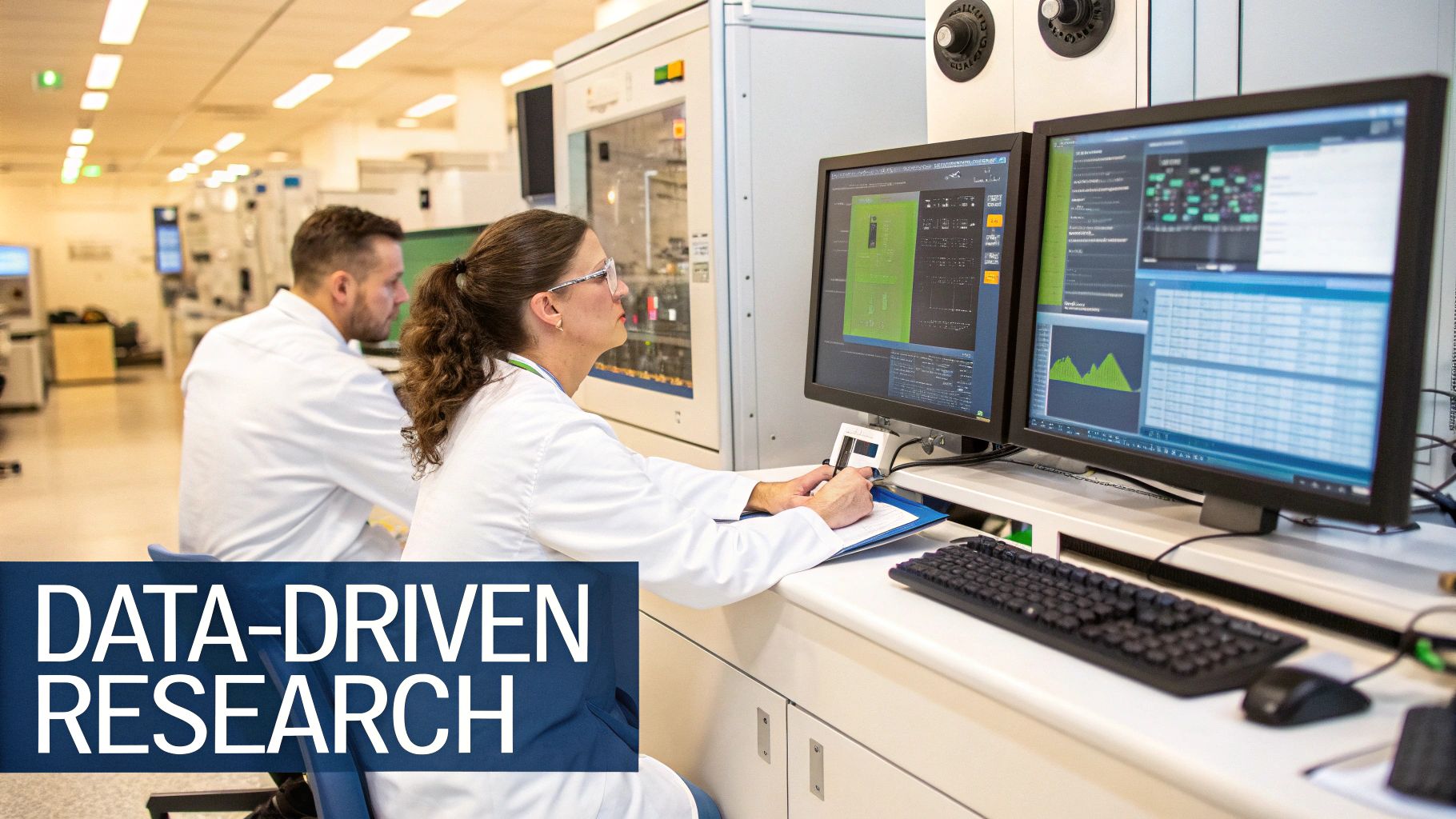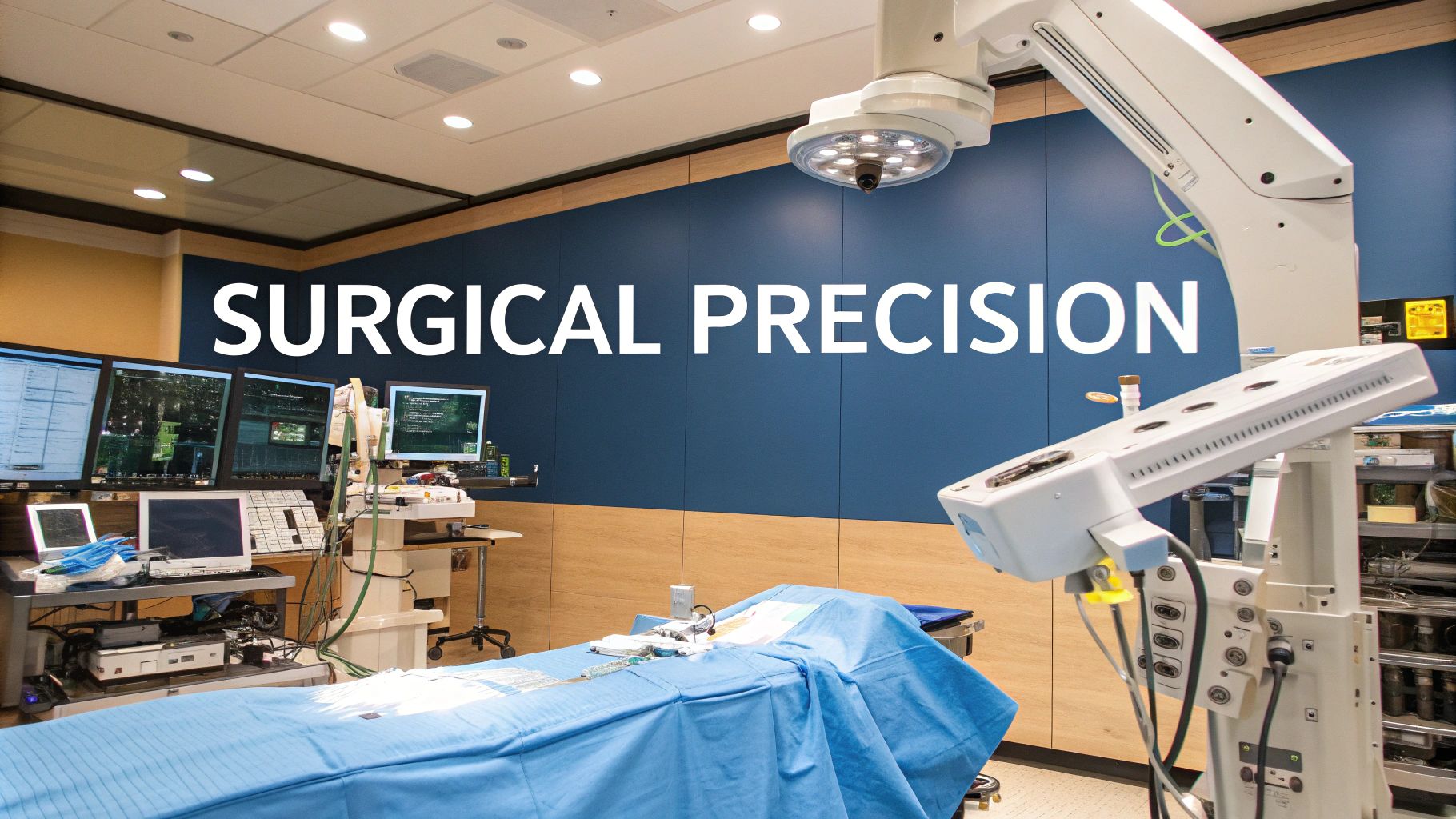AI Trends in Healthcare: Transforming Patient Care Through Evidence-Based Innovation
AI in Healthcare: Making Treatment More Effective Through Data
AI is quickly becoming an essential part of modern healthcare, powered by better computing and vast amounts of medical data. These advances are helping solve core challenges in patient care and opening new possibilities for treatment. The numbers tell a clear story – the AI healthcare market is set to grow from $22.4 billion in 2023 to $208.2 billion by 2030, showing just how much this technology is changing medicine.
Better Patient Monitoring and Diagnosis
AI is making a big difference in how doctors track patient health. New AI systems can analyze vital signs, lab work, and medical images to spot potential problems early. For example, these tools can detect small changes in heart rate or breathing that might signal an upcoming cardiac issue, letting doctors step in before it becomes serious. This helps both save lives and use hospital resources more efficiently by focusing on the patients who need care most urgently. In medical imaging, companies like Behold.ai are helping radiologists find problems faster and more accurately than ever before.
Making Healthcare Run More Smoothly
AI is also helping hospitals and clinics work better behind the scenes. It can handle paperwork like insurance claims and appointment scheduling, giving medical staff more time with patients. AI chatbots now answer common patient questions, making it easier to get health information and cutting down wait times. These improvements save money and help healthcare providers focus their resources where they matter most.
More Personal Treatment Plans
Thanks to AI, doctors can now create highly specific treatment plans based on each patient's genes, lifestyle, and environment. AI programs look through huge amounts of patient data to find patterns that show which treatments might work best. This means moving away from one-size-fits-all medicine toward care that's matched to each person. This approach is especially promising for treating cancer, heart disease, and long-term health conditions.
Working Through AI's Growing Pains
While AI offers many benefits to healthcare, there are important issues to address. Keeping patient data private and secure is crucial. We also need to think carefully about how AI should be used in medical decisions. Making sure AI systems are fair and transparent is key to building trust with patients and avoiding unfair treatment. Solving these problems is essential if we want to use AI effectively while keeping patient care safe and ethical.
Evidence-Based AI Applications in Patient Monitoring
Clinical data shows that AI tools are delivering real, measurable benefits for patient monitoring in hospitals. Moving beyond theoretical potential, we now have clear evidence demonstrating how AI improves patient care outcomes when properly implemented and validated.
Chartwatch: A Case Study in AI-Driven Patient Monitoring
St. Michael's Hospital in Toronto provides an excellent real-world example with their Chartwatch system. This AI tool continuously monitors over 100 different patient metrics, from basic vital signs to detailed lab results, watching for early warning signs of health issues. Unlike traditional monitoring that focuses on a few key measurements, Chartwatch spots subtle patterns across many data points that humans might miss. The system alerts medical staff before problems become serious, allowing for early intervention. The results speak for themselves – the hospital saw 26% fewer unexpected deaths after implementing Chartwatch. This shows how AI can help shift care from reactive to preventive by identifying risks early.
Validating AI Systems for Clinical Accuracy
For AI systems like Chartwatch to work effectively in hospitals, they need thorough testing and validation. The process starts with training the AI on large sets of real patient data, teaching it to spot important patterns and predict outcomes. Then comes rigorous testing on new data the system hasn't seen before to confirm it makes accurate predictions. Regular monitoring after implementation ensures the system maintains its accuracy over time and adapts as medical practices evolve. This careful validation process ensures AI tools actually improve patient care rather than just sounding good in theory.
Integrating AI with Existing Clinical Workflows
For AI to truly help patients, it needs to fit smoothly into how doctors and nurses already work. The goal is to support healthcare staff, not replace them. For example, when AI systems flag high-risk patients, they help medical teams focus their attention where it's needed most. This makes the whole team more efficient. But getting there requires thoughtful implementation – from designing easy-to-use interfaces to training staff properly to establishing clear protocols for how AI alerts should be handled. When done right, AI becomes a valued tool that enhances human medical expertise while keeping the personal touch in patient care.
AI Integration: Making Healthcare Operations More Efficient
Healthcare organizations are increasingly turning to data analysis tools to improve their operations and patient care. As organizations adopt AI systems, there's a clear focus on finding the right balance between automation and human oversight. The goal is straightforward – use technology to reduce costs and improve efficiency while maintaining high standards of care and safety.
Automating Administrative Tasks
Medical staff spend a large portion of their time on paperwork rather than patient care. AI tools are helping to change this by taking over routine administrative work. For example, processing insurance claims traditionally requires hours of manual review. AI systems can now check claims for errors and speed up approvals in a fraction of the time. This means staff can focus more on patients, while healthcare providers save money and patients receive faster reimbursements.
Enhancing Communication and Access
Many healthcare providers now use AI chatbots and virtual assistants to improve patient support. These tools handle basic tasks like answering common questions, booking appointments, and providing general health information around the clock. When patients need specific help, the AI directs them to the right department or specialist. This setup reduces wait times, helps staff focus on complex cases, and makes it easier for patients to get the information they need quickly.
Optimizing Resource Allocation
Managing staff and resources efficiently is essential for hospitals and clinics. AI helps by analyzing patient data, tracking bed availability, and predicting busy periods. This allows facilities to schedule the right number of staff at the right times and prepare rooms between patients more efficiently. For instance, AI can forecast when patients are likely to be discharged, helping hospitals plan ahead for new admissions. These improvements lead to shorter wait times and better use of available resources.
Maintaining Quality and Safety
While AI brings many benefits to healthcare operations, safety and quality remain top priorities. Before implementing any AI system, healthcare providers need to thoroughly test it and continue monitoring its performance. Staff must oversee the AI tools, especially for important decisions, to ensure they work correctly and ethically. As noted by DebugBar, which covers technology trends, successful AI integration requires careful planning and ongoing supervision. This approach helps healthcare organizations use AI effectively while keeping patient safety at the forefront.
AI-Enabled Precision Medicine: From Research to Practice
Medicine is becoming more personalized thanks to AI's ability to analyze complex medical data. Instead of using generalized treatments, doctors can now examine each patient's unique genetic information, health history, and lifestyle factors to create custom treatment plans. This shift toward individualized care is already leading to better outcomes for many patients.
Predictive Modeling for Personalized Treatment
AI is changing how doctors predict and prevent disease. By analyzing a patient's genes, medical records, and daily habits, AI tools can estimate their risk for conditions like diabetes or heart problems. This helps doctors take action early – they can recommend lifestyle changes or start treatments before serious issues develop. For cancer treatment especially, AI helps doctors move away from standard approaches and choose therapies that match each patient's specific case.
AI-Driven Diagnostics: Enhancing Accuracy and Speed
Better diagnostic tools powered by AI are helping doctors work more effectively. AI systems can spot tiny details in medical scans that humans might miss, leading to earlier and more precise diagnoses. When doctors input a patient's symptoms and medical background, AI can suggest possible conditions to investigate. This is particularly valuable in emergencies like potential strokes, where quick and accurate diagnosis can save lives.
Real-World Applications and Patient Outcomes
Many hospitals are already seeing success with AI-guided precision medicine. Some facilities use AI to customize chemotherapy plans for cancer patients, which has reduced side effects while making treatments more effective. Other medical centers apply AI to help manage chronic conditions like diabetes – patients using AI-assisted care plans often achieve better control of their blood sugar with fewer complications. These examples show how AI is making a real difference in patient care today.
The Future of AI in Precision Medicine: Continuous Validation and Ethical Considerations
As AI becomes more common in healthcare, careful testing and ethical oversight remain essential. Medical teams must thoroughly verify that AI systems are accurate and reliable before using them with patients. Important questions about patient privacy, potential bias in AI systems, and finding the right balance between computer assistance and human medical judgment need ongoing attention. By maintaining high standards for both technical performance and ethical practices, we can help AI improve healthcare while keeping patient wellbeing as the top priority.
Navigating Clinical Implementation Challenges
Bringing AI into healthcare offers exciting possibilities but comes with real challenges that need careful handling. Making it work requires focusing on keeping patients safe, protecting their data, and following all the rules. Healthcare providers need to think about both the technical side and what it means for patient care in practice.
Ensuring Patient Safety and Data Security
Patient safety must come first when using AI in healthcare. While AI tools can be powerful allies, they aren't perfect and need thorough testing. Take AI diagnostic tools – they must go through extensive clinical trials to prove they work reliably and won't lead to wrong diagnoses. We also need to keep checking these tools over time to catch any biases or mistakes that might show up. This helps make sure AI makes healthcare better, not worse.
Protecting patient data is equally important. AI systems need lots of sensitive medical information to work properly. This means healthcare providers must invest in strong security systems, carefully control who can access data, and follow privacy laws like HIPAA. Getting this right is crucial – patients need to trust that their private information is safe.
Addressing Ethical and Practical Considerations
The ethical side of AI in healthcare needs careful attention too. AI systems can pick up and repeat biases from their training data. For example, if an AI mainly learned from data about one group of patients, it might not work as well for others. That's why we need to actively look for and fix these biases. Being open about how AI makes decisions also helps build trust with patients and staff.
Making AI work in real healthcare settings brings its own challenges. New AI tools need to fit smoothly into how doctors and nurses already work. Staff need good training to understand these tools – both what they can do and what their limits are. They need to know when to trust the AI and when human judgment should take over.
Regulatory Compliance and Industry Standards
Following healthcare regulations is another key piece of the puzzle. There are many rules about patient privacy, safety, and medical devices that AI systems must meet. Healthcare providers need to stay current with these rules and build them into how they use AI. Working closely with regulators and experts helps make sure everything is done properly and safely.
By tackling these challenges head-on, healthcare organizations can use AI to improve patient care while maintaining high standards. This means creating clear guidelines, building strong systems, and helping staff learn and adapt. With careful planning, AI can help deliver better healthcare for everyone.
Future Developments: Evidence-Based Innovation
AI continues to shape healthcare in meaningful ways as researchers explore new applications. Current developments focus on practical tools that can improve patient care while maintaining rigorous testing and validation. This careful approach helps ensure new AI healthcare solutions are both effective and safe.
Enhanced Diagnostic Accuracy Through AI
AI shows great promise in making diagnoses more accurate and timely. New tools help doctors spot subtle details in medical images that could indicate early signs of illness. For example, AI systems can now scan X-rays and MRIs to find small markers of cancer or heart disease that might otherwise go unnoticed. This means patients can start treatment sooner, often leading to better results. In critical care units, AI programs monitor patient vital signs around the clock, alerting medical staff to concerning changes before complications develop.
AI-Powered Treatment Planning and Personalized Medicine
Doctors are starting to use AI to create more personalized treatment approaches. By examining a patient's specific genetic makeup, health history, and daily habits, AI helps identify which treatments are most likely to work best for each person. This is especially helpful for cancer treatment and managing long-term health conditions. Instead of using standard treatment plans, doctors can now adjust care based on what works for each individual patient.
AI for Improved Patient Care and Remote Monitoring
AI tools are making it easier for patients to manage their health at home. Smart health assistants can send medication reminders, answer basic health questions, and help people track their conditions. New monitoring devices paired with AI can keep an eye on patients' health measurements and send alerts to doctors if something seems wrong. This helps catch problems early and keeps patients more involved in their own care. Many people find they need fewer hospital visits when using these tools.
Validating New AI Applications: A Focus on Evidence
Before new AI healthcare tools become widely available, they must prove their worth through careful testing. Medical centers conduct thorough clinical trials to make sure these tools actually help patients and don't cause harm. This testing process, while time-consuming, is essential for maintaining high-quality care. DebugBar tracks these developments and emphasizes the importance of proper testing and ethical guidelines as AI becomes more common in healthcare.
Ready to explore how AI can elevate your content strategy and help you stay ahead of the curve? Learn more about DebugBar's insights and tools at https://www.debugbar.com/.




Comments
Leave a comment